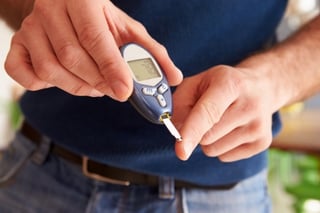 Every month, Chase Medical Research hosts a diabetes information session presented by Janet Schaefer, Dietitian and Certified Diabetes Educator. Here is an excerpt from one of our recent sessions:
Every month, Chase Medical Research hosts a diabetes information session presented by Janet Schaefer, Dietitian and Certified Diabetes Educator. Here is an excerpt from one of our recent sessions:
Common Diabetes Myths
Before we get any farther I want you to clear your head of anything you may have heard about diabetes or managing your blood sugar. I’m going to share some things that may be different to what you have heard but I promise you they are the best ways to lower your blood sugar, lose weight and slow the progression of diabetes.
Because diabetes is a progressive disease, it only gets worse over time. But the good news is we can take steps to slow its progression. When it's well controlled, diabetes doesn’t have to take away from your quality of life or be a threat to your health.
So What's Really Going On?
So let's talk a little bit about what's going on inside your body. The food you eat, particularly carbohydrates, turns to sugar. Sugar enters the bloodstream, but it doesn’t want to stay in your bloodstream; it wants to go to your liver, your muscles and your fat cells. Those are the cells, particularly muscle and liver, that take sugar and turn them into energy. So sugar isn’t our enemy, it's a fuel. It's like gasoline in your car. You need a certain amount, rather it's when you have too much that we run into problems. But, sugar can’t get into the cells from the bloodstream by itself, it needs insulin. Insulin is a hormone made from the pancreas and its main job is to unlock the cell door and let the sugar in.
Types of Diabetes
 Type One Diabetes usually develops very early in life which is why it used to be called “juvenile diabetes." Type One Diabetes is autoimmune, which means your body attacks its own systems. In Type One, the body destroys its own insulin and sugar can’t get into the cell. For people with type one diabetes they have to take insulin muliple times per day or they most likely won't survive. Most people have Type 2 Diabetes, formerly called “adult-onset diabetes.” They aren’t called juvenile and adult any longer because now children are developing Type 2 Diabetes.
Type One Diabetes usually develops very early in life which is why it used to be called “juvenile diabetes." Type One Diabetes is autoimmune, which means your body attacks its own systems. In Type One, the body destroys its own insulin and sugar can’t get into the cell. For people with type one diabetes they have to take insulin muliple times per day or they most likely won't survive. Most people have Type 2 Diabetes, formerly called “adult-onset diabetes.” They aren’t called juvenile and adult any longer because now children are developing Type 2 Diabetes.
In Type 2 Diabetes, the problem starts in the cell. You are producing insulin, but your cells become insulin resistant. Insulin can’t do its job adequately of letting sugar into the cells. Type 2 Diabetes always starts with insulin resistance. You are usually insulin resistant for 5 to 10 years before you are considered a type 2 diabetic.
The problem is Type 2 Diabetes can be silent. You won’t have serious symptoms until your blood sugar is really high or really low.
Type 2 Diabetes is about insulin resistance, so we need to talk about how we can become less insulin resistant and get our blood sugar down.
Insulin Resistance
The biggest reason we are insulin resistant is your family, it is highly genetic. Excess weight or poor diet are factors, but the biggest factor in determining if you have diabetes is your family history. A second reason is ethnicity. Some ethnicities are more prone to diabetes than others. Third is age; as we get older the cell wall becomes more rigid, making it difficult for blood sugar to be absorbed from the blood stream, plus as we age we lose muscle and our pancreas becomes less effective in producing insulin.
The average age of insulin resistance onset is 45 and most people develop diabetes 5 to 10 years after that.
Since these three factors (family history, ethnicity and age) are all of our control, let's focus on what we can control which is weight and exercise....
If you liked this excerpt of our diabetes education sessions...please consider attending one of our monthly sessions at our Waterbury, CT location. They are free and open to the public.
New Diabetes Trials
Chase Medical Research is currently enrolling in multiple different clinical trials related to diabetes. Learn more about these trials and to see if you would qualify today.
Share This Post
Recent Posts
- The Relationship Between Obesity and Obstructive Sleep Apnea February 21 2016
- Cardiovascular Outcome Clinical Trials February 21 2016
- Diabetic Peripheral Neuropathic Pain February 21 2016
- Are All Types of Cholesterol Bad? February 21 2016
- Blood Pressure: The Highs, the Lows, and Everything in Between February 21 2016
Categories
- Clinical Trials
- Cardiovascular Disease
- Diabetes
- Obesity
- Kidney Disease
- Hypertension
- Pain Management
- Vaccine
- Cholesterol
- Chronic Obstructive Pulmonary Disease
- Diabetic Peripheral Neuropathy
- Migraine
- Osteoarthritis
- Biologics
- COVID-19
- Gastroesophageal Reflux Disease
- Irritable Bowel Syndrome with Constipation
- Lyme Disease
- Nonalcoholic Steatohepatitis
- Respiratory Syncytial Virus



